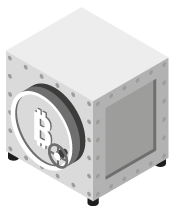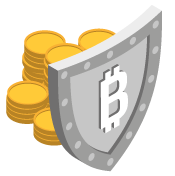
Bitcoin wallets are software programs that are one of the many ways to store Bitcoin. They help keep your public and private keys safe and give you a way to send and receive Bitcoin while monitoring your balance and interacting with the blockchain. If you have Bitcoin, understanding the ways to store Bitcoin is absolutely essential. There are a number of wallet solutions out there, but there are only two main types – hot wallets and cold wallets.
A hot wallet is one answer to the “where to keep your Bitcoin” question. It is connected to the internet, and you can access it at any point in time. A cold wallet is also one of the many ways to store Bitcoin, but unlike a hot wallet, it isn’t connected to the internet. It is the safest way to store Bitcoin because you’re completely offline, and you can get funds at any point in time; you just can’t transfer them out. If you’ve seen hot wallets, you’ve likely seen them listed as cloud wallets, as most mobile wallets are hot wallets. Cold wallets include hardware wallets, offline paper wallets, and USB wallets. Cold wallets are essentially Bitcoin offline storage options.
Wondering why wallets are the answer to “where to keep your Bitcoin”? There are actually many reasons. One of the biggest reasons is that the cryptocurrency exchange, where you might get your funds, leaves those funds in control of the exchange. That means that you may be more susceptible to theft and fraud. In fact, more than $1.5 billion in cryptocurrency was stolen from exchanges in 2018, which only further proves the risk of leaving it there. The safest way to store Bitcoin is a wallet, but because there are so many options available, your best bet is to understand how to store Bitcoin safely with the wallet options you have.
Further Understanding The Types of Bitcoin Wallets

You know the safest way to store Bitcoin is in a wallet, but try typing “Bitcoin Wallet” into any search engine, and you’re quickly going to be overwhelmed by the number of choices out there. You’ll have to choose between online storage and Bitcoin offline storage – hot and cold, respectively – as we previously mentioned, but there’s more. Fortunately, we can further break down the distinction between hot and cold wallets into four total wallet types. The first two are cold wallets, which are both a good way to store bitcoin securely.
Paper wallets and hardware wallets are both cold wallets, or Bitcoin offline storage, and they’re both a way to store Bitcoin securely. Paper wallet is the idea that you have a physical paper copy of both your public and private keys. In some cases, software has generated a pair of keys and a digital file that you can print, but either way, this option means a very high level of security. You can even import the paper into a software client when you’re ready to use it. Keep in mind while this is a good way to store bitcoin securely, there are potential risks involved. Paper wallets can be damaged, and they can be easy to take pictures of and use elsewhere. To keep them safe, many people laminate them, store them in safes, or place them in bank vaults.
Hardware wallets are also Bitcoin offline storage, or cold wallets, and they’re one of the many ways to store bitcoin securely. They’re a way to store your private keys on an external device, like a hard drive or a USB stick. They can be used to make online payments too, and in some cases, they’re compatible with a web-type interface so you can bring things online to make your transactions a bit easier and more convenient. You just plug it into a device, unlock it, and confirm the transaction you’d like to make.
These are considered the single safest way to store Bitcoin, but they aren’t free. Make certain you never buy one from another person, as that means you could be opening yourself up to risk. Instead, despite the price difference, you’ll want to get the wallet directly from the manufacturer. As soon as you get it, you’ll want to initialise it, then reset it on your own.
Cloud wallets and software wallets are both considered hot wallets. Cloud wallets allow you to access your funds from anywhere in the world using any kind of device. They’re incredibly convenient, but they do store your private keys online, and that means that a third party could take advantage of those keys and steal your Bitcoin. Software wallets are also hot wallets. These are tied to a specific device – like a personal computer or a smartphone, and some even allow you to access your funds from more than one device simultaneously. Keep in mind, though, it is possible to be hacked with a software wallet or to have a virus on your machine that makes you vulnerable to hacks.
Keeping Your Bitcoin Safe

Once you’ve examined all of your wallet choices and decided where to keep your Bitcoin, you have to decide how to keep your private keys safe. Most people take a few steps to make this possible. First, as mentioned above, never keep your cryptocurrency on the exchange for longer than you have to. Second, you’ll want to enable two-factor authentication wherever you can. That will help to keep your accounts a bit safer. Should you choose a hardware wallet, you’ll want to be sure you select a PIN that is actually difficult to guess. Make sure your 24 word Bitcoin hardware wallet backup recovery sheet isn’t online anywhere. You’ll want to trust only what you see on your hardware wallet screen and make sure you verify every bit of information you see on the device. Also, make certain that you realise any device can get compromised at any point in time. That’s what makes a backup Bitcoin plan a good idea. Finally, understand that you should never discuss your Bitcoin holdings under your name or even an identifiable address on any public forums. It is possible to steal your bitcoin even if you keep them in a cold storage, so the last thing you want to do is offer clues to exactly where you’re at.
There are also other things you can do to help keep your Bitcoin safe. Be sure that you don’t visit any phishing sites. There are lots of bogus sites that have addresses just a single letter or number off, and they’re designed to steal your login information. Make sure any web address you’re using associated with your cryptocurrency is correct. You’ll also only want to use HTTPS websites. If it’s a legitimate website, it probably has that type of web address. Along with that, be sure you’re double checking your Bitcoin addresses. There are malicious programs out there that will edit and paste the wrong transaction address any time you send. Often that address belongs to a hacker, so always check before you actually send. A secure Wi-Fi connection is a must, too. If you’re connecting to your online wallet or even your exchange account, don’t do so with public WiFi. Even if you’re in a safe location, make sure the WiFi uses WPA-2 protocol or another point of strong encryption. Finally, don’t keep all of your Bitcoin in one place. You may want to use both a hot and a cold wallet solution. Cold storage is great for stuff you want to hang on to for the long term. Hot storage can be for smaller amounts that you might use to trade or for other transactions.
Backing Up Your Bitcoin

It is possible to backup Bitcoin. There are many programs and instruction sheets online to help you backup your Bitcoin, and many wallets offer a simple walkthrough guide so you can safely do it. Most wallets (particularly those hot storage spaces) generate a seed phrase that you can write down and store somewhere safely in case you lose your wallet. It’s typically a number of words (often twelve), and they’re completely random. To restore your backup, Bitcoin wallets require you to enter those random words in the exact order in which they were generated. Another way to backup Bitcoin is to export your keys, but not every software wallet allows you to do so. If you plan to, be sure to disconnect your computer from the internet before you do.
While both of those are ways to keep your hot wallets safe, you can also create a Bitcoin hardware wallet backup as well. There are some hardware wallets that generate a number of random words (just like the hot wallets do). If that’s the case, be sure to store the words and your wallet in separate locations in case one gets destroyed. You may also want a paper copy of everything you’ve stored on your USB as a Bitcoin hardware wallet backup. Stored in a safe deposit box, you’ll help keep absolutely everything safe.
Be Careful with Your Security Measures

It’s easy to make your Bitcoin security way too complicated, so ensure that you’re only utilising security measure that make sense to you. Remember that you can lose your Bitcoin in the maze of security you created, and losing your access to your keys in any way means that you’ll no longer control your Bitcoin. Make it easy for you to get in but not quite as easy for a hacker to gain access to your money.